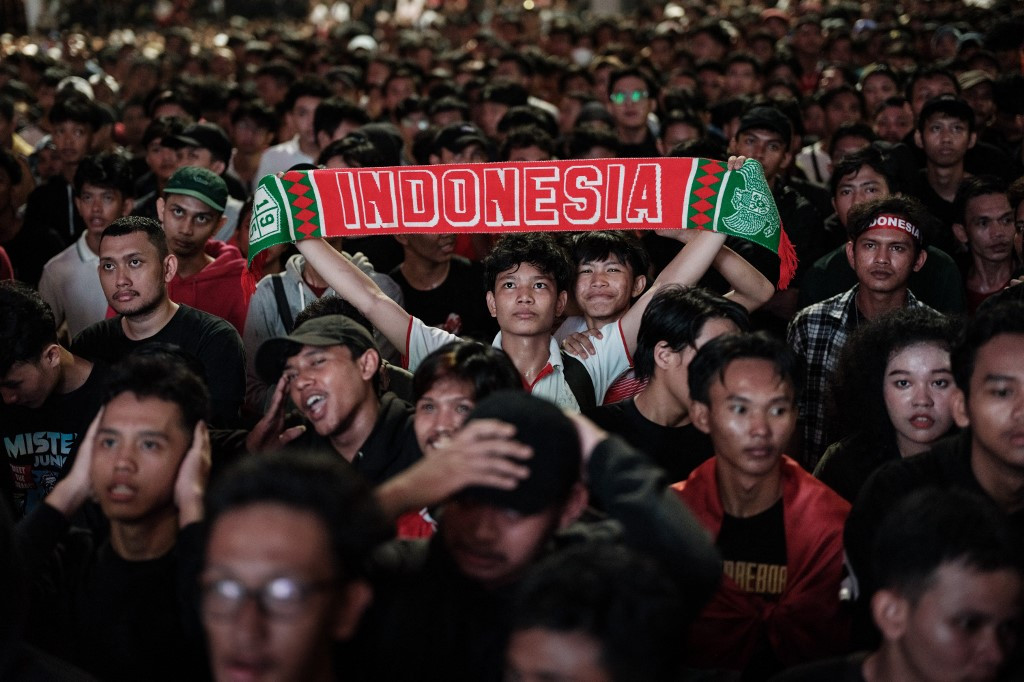Popular Reads
Top Results
Can't find what you're looking for?
View all search resultsPopular Reads
Top Results
Can't find what you're looking for?
View all search resultsShow red cards for bad fans
Indonesian soccer fans’ behavior is a hindrance to the nation’s aspirations to see Indonesia become a great soccer nation.
Change text size
Gift Premium Articles
to Anyone
I
t seems as though the Indonesian soccer landscape, at both the domestic and international level, is destined to continue providing bad news after bad news.
The latest bad news comes from FIFA, with the world soccer body issuing a sanction against the Soccer Association of Indonesia (PSSI) after it found that a group of Indonesian fans made xenophobic chants during the 2026 World Cup qualifier match between Indonesia and Bahrain.
It was unclear what the fans were singing against the opposing players, but their chants caused PSSI to be slapped with a Rp 400 million (US$24,205) fine and a 15-percent reduction of spectators for Indonesia’s next qualifier match against China in Jakarta.
FIFA also told the Indonesian soccer association to display anti-discrimination banners during the match against China and to develop a comprehensive plan to combat discrimination in Indonesian soccer.
The news is disappointing, especially as millions of Indonesian soccer fans are on the edge of their seats over the nation’s chance to make its debut in the world’s top soccer competition in next year’s World Cup in North America.
But the sanction is barely surprising, judging from the behavior of Indonesian soccer fans that often makes headlines in the country and elsewhere in the world.
The FIFA sanction for xenophobic chants against the Bahrainis came one year after Indonesian social media users were widely reported for making racist comments online toward players of Guinea’s Under-23 men’s team.
The remarks were made after the African team beat their Indonesian counterparts, ending the Southeast Asian nation’s dream to play soccer at the Olympics for the first time in nearly seven decades.
We should also not forget that the Kanjuruhan stadium disaster in Malang, East Java, in October 2022 that claimed more than 130 lives was triggered by hooliganism by fans of Arema FC soccer club, and exacerbated by trigger-happy police officers and inadequate security measures from the stadium management.
It seems that fans did not learn much from the 2022 stampede. When Arema returned to Kanjuruhan for their first league match on May 11 after nearly three years, a group of people suspected to be their supporters threw rocks and damaged a bus used by Persik Kediri, the club’s opponent that night.
These snippets of Indonesian soccer fans’ behaviors are embarrassing and are a hindrance to the nation’s aspirations to see Indonesia become a great soccer nation. To stand among giants such as Brazil, Argentina, Spain and England, Indonesia must work seriously with its players on the pitch, but also its fans off the pitch.
Among the best practices in Europe that can be tried in Indonesia is increasing the monitoring of fans’ actions around the match and slapping serious punishments on those found violating the laws. Sanctions can range from a lifetime ban from attending matches to huge fines against the club, assuming no fans want to see their club suffer from their actions.
Furthermore, the PSSI can also work with law enforcement bodies to slap criminal charges against fans using hate speech against players or officials. Indonesia is not lacking in laws to punish individuals found using hate speech against certain races, ethnicities or groups in public.
Aside from formal measures, the association can also work with players and other influential figures to call on fans to stop using hate speech and committing violent acts during games. Fellow fans can also work to warn others and discourage them from making unwanted comments, although the chance of this happening may be slim as supporters can be caught in the heat of the moment.
Fan management is something that PSSI and other stakeholders in Indonesian soccer need to address now, as the country is dreaming to stand proudly on the international stage.
Otherwise, our naturalized and local players could only hang their heads in shame because Indonesia is known as a rude and violent nation in soccer.











